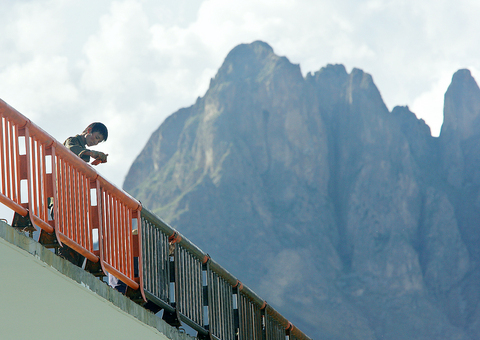Under a blistering Himalayan sun, 500 workers are completing the Lhasa River Bridge, part of a 1,142km project that will link Tibet by rail to the outside world for the first time.
Remarkably for a project that will supposedly bring new hope and opportunity to the local economy once it becomes operational in 2007, only a tiny number of the 500 people toiling on the 929m bridge are Tibetan.
Hiring practices

PHOTO: AFP
"Very few of the people employed here are ethnic Tibetans," said Wang Weidao, chief engineer on the bridge. "They don't have the technical training needed for the task."
While Wang was speaking, workers from as far away as China's Hubei Province were pushing wheelbarrows, sweeping dust and performing other non-specialized or technically undemanding tasks.
Foreign observers have long criticized the rail project, begun in 2001, for favoring members of China's Han majority over Tibetans.
But they also fear that once the railroad has connected Tibet with neighboring Qinghai Province in two years' time, it will continue to benefit the Han Chinese first and local Tibetans last.
Officials in Lhasa, by contrast, emphasize the advantages they say the rail line will bring to the Tibetans, such as greatly reduced transportation costs for Tibetan products.
"Tibet is rich in water resources, but if we want to sell water to other provinces, now we have to use trucks or buses," said Xu Jianchang, deputy director general of the Tibetan Development and Reform Commission.
"After the rail is constructed, the local resources can be transported at much lower fees," he said.
But what worries pro-Tibet advocates overseas is that when the rail link is completed, a train ride from Beijing to Lhasa will take just 48 hours, and Tibet will suddenly be within much easier reach for millions of job hunters.
Immigration
The Tibetans, who are already under pressure from massive Han immigration, could end up becoming even more marginalized, said Kate Saunders, the Washington-based spokeswoman for the International Campaign for Tibet.
"Population movements will be encouraged by the shorter travel times, lower transportation costs, and enhanced connections to an increasingly Chinese cultural and economic network," she said. "These movements represent a significant threat to the livelihoods and culture of the Tibetan people as well as to their prospects for achieving genuine political autonomy."
Local officials acknowledge that the rail will make it easier for Han Chinese to go to Tibet, but deny that Tibetans have so far lost jobs to migrant workers.
Currently, about 50,000 migrants arrive annually in Lhasa, a city of about 250,000, said Zhang Jianbo, a senior macroeconomist with the development and reform commission. Most of them leave after a few months of employment, he said.
But some do decide to stay on, and gradually they succeed in pushing Tibetans out of entire industries at a time, critics argue.
In one high-profile instance, taxi drivers were mostly Tibetan until a few years ago, but are now mainly Han Chinese.
"That's because the taxi business has become less lucrative and many Tibetans have decided to change jobs," said Zhang, the economist.

BACKLASH: The National Party quit its decades-long partnership with the Liberal Party after their election loss to center-left Labor, which won a historic third term Australia’s National Party has split from its conservative coalition partner of more than 60 years, the Liberal Party, citing policy differences over renewable energy and after a resounding loss at a national election this month. “Its time to have a break,” Nationals leader David Littleproud told reporters yesterday. The split shows the pressure on Australia’s conservative parties after Prime Minister Anthony Albanese’s center-left Labor party won a historic second term in the May 3 election, powered by a voter backlash against US President Donald Trump’s policies. Under the long-standing partnership in state and federal politics, the Liberal and National coalition had shared power

CONTROVERSY: During the performance of Israel’s entrant Yuval Raphael’s song ‘New Day Will Rise,’ loud whistles were heard and two people tried to get on stage Austria’s JJ yesterday won the Eurovision Song Contest, with his operatic song Wasted Love triumphing at the world’s biggest live music television event. After votes from national juries around Europe and viewers from across the continent and beyond, JJ gave Austria its first victory since bearded drag performer Conchita Wurst’s 2014 triumph. After the nail-biting drama as the votes were revealed running into yesterday morning, Austria finished with 436 points, ahead of Israel — whose participation drew protests — on 357 and Estonia on 356. “Thank you to you, Europe, for making my dreams come true,” 24-year-old countertenor JJ, whose

A documentary whose main subject, 25-year-old photojournalist Fatima Hassouna, was killed in an Israeli airstrike in Gaza weeks before it premiered at Cannes stunned viewers into silence at the festival on Thursday. As the cinema lights came back on, filmmaker Sepideh Farsi held up an image of the young Palestinian woman killed with younger siblings on April 16, and encouraged the audience to stand up and clap to pay tribute. “To kill a child, to kill a photographer is unacceptable,” Farsi said. “There are still children to save. It must be done fast,” the exiled Iranian filmmaker added. With Israel

Africa has established the continent’s first space agency to boost Earth observation and data sharing at a time when a more hostile global context is limiting the availability of climate and weather information. The African Space Agency opened its doors last month under the umbrella of the African Union and is headquartered in Cairo. The new organization, which is still being set up and hiring people in key positions, is to coordinate existing national space programs. It aims to improve the continent’s space infrastructure by launching satellites, setting up weather stations and making sure data can be shared across